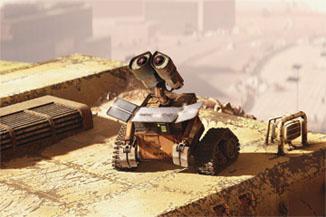Review: WALL-E
By Matthew Huntley
July 7, 2008
A spacecraft eventually comes to pick EVE up and WALL-E stows away onto the Axiom, where the movie takes its third big risk. Humans have become a bunchy of lazy, overweight slobs, brainwashed by comfort, lounging and automation. Each human has a round figure and appears tired, apathetic and uninspired, with all their emotions repressed. They no longer walk, run, swim or dress themselves, having practically descended into a period of de-evolution. This is all meant to remind us of the dangers of letting ourselves be overridden by products and comfort while shutting out nature and exercise.
The second half of the film aboard the Axiom revolves around WALL-E attempting to rescue EVE as she maintains her directive and delivers the plant to the Axiom's captain (Jeff Garlin), who gets instructions from Buy 'n Large's former CEO (Fred Willard) to insert the plant into an Axiom chamber, upon which an automated process will take place and the human race will return to Earth. But another robot aboard the ship has been programmed to prevent this from happening for reasons I won't reveal.
Compared to other Pixar movies, WALL-E is by far the most interesting and challenging. It's not the most entertaining per se (that credit goes to Toy Story 2 and Ratatouille), but it takes bigger risks with its methods. The film isn't shy and contains a dark, cynical and harsh tone, made watchable for kids by its sweet, likable hero. Unlike other Pixar movies, it's not full of humor, slapstick and traditional feel-good emotion. It lacks the hearts of, say, Finding Nemo and The Incredibles, but, in a way, I admire it more for that reason. Why should the idea of devastating our planet be happy and cuddly? WALL-E doesn't make us feel the way we want and asks us to face difficult realities. As much as we may not want to admit it, it's going to take the human race a long time to undo what we're doing to ourselves and our planet. At least WALL-E offers hope we'll be able to overcome it...eventually.
I've mentioned the film takes risks, but these would be for naught if the filmmakers didn't capitalize on them with an engaging story, and director Andrew Stanton finds a way to relay a valuable message to viewers without drifting into cartoonish sentimentality. Yes, we have heard the same message before, but it's never been delivered this way. Given Pixar's track record, I almost thought it would go the entire distance and sacrifice the typical happy ending. Exactly how it ends I will not say, but it's good despite playing it safe.
WALL-E is a film I expect to love and admire more with each viewing. Pixar goes beyond their bright, zany and enormously entertaining family pictures and takes one step closer towards higher art. They experiment with the family genre and successfully create an experience that may not be as heavy on traditional emotion and comedy, but it gives us something more thoughtful and hard-hitting, not to mention something visually stunning.
Continued:
1
2
|
|
|
|




